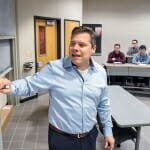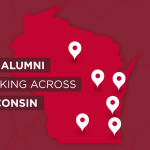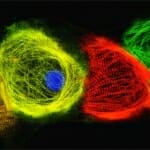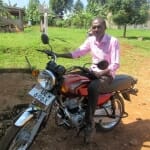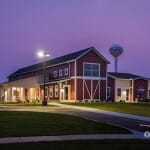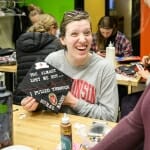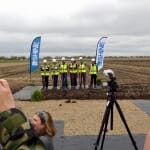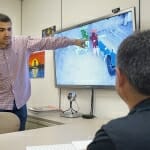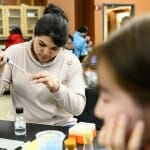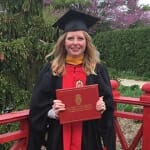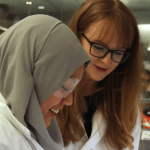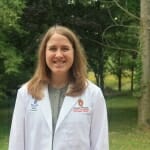UW Changes Lives: SuccessWorks guides L&S students to careers
A fast-growing number of students at the College of Letters & Science are turning to SuccessWorks to help prepare them for a career after college.
Sensor from Antarctic observatory IceCube joins Smithsonian collection
IceCube uses thousands of these sensors embedded in a cubic kilometer of ice underneath the South Pole to track neutrinos, invisible subatomic particles that traverse space at nearly the speed of light.
UW Changes Lives: Business school expands reach with three new MS degrees
In Fall 2019, WSB will offer three new specialized master of science degree programs in business analytics, real estate, and supply chain management, helping to address a market need.
Wisconsin Union Theater director Ralph Russo retires
His accomplishments in his 15 years at the helm of the Wisconsin Union Theater include overseeing the theater's renovations and increasing the number of students participating.
UW Changes Lives: WSB alumni make a difference throughout state
Wisconsin School of Business alumni are driving Wisconsin’s economy in industries and markets as varied as the talented individuals who are leading them. Meet six Business Badgers whose work makes an impact in Wisconsin.
Supportive environment helps group of female graduate students in mathematics reach lofty goals
Already a leader in the number of women hired as faculty members, the mathematics department hopes to continue improving the experience for female students to help bring equity to the field.
A new way to wind the development clock of cardiac muscle cells
A study published in the journal Stem Cells describes a new and unexpected way to accelerate the maturation of induced pluripotent stem cells into cardiac muscle cells.
Canada firm expands in Wisconsin to hire more farm-raised engineers
MacDon set up shop in Madison in 2015 for a simple reason: Because of the abundance of engineers with farm experience, mostly educated at UW–Madison.
Using motorcycles and 55-cent payments, Uganda groups maps route to health care in remote villages
By helping organize monthly clinics and lending to motorcycle buyers who are obligated for 18 months to transport health care workers, a nonprofit has connected health-care providers and patients in remote villages in Uganda.
UW Changes Lives: Helping small businesses thrive
The WIsconsin Small Business Development Center at UW–Madison works with hundreds of business each year. Read about their success stories, range from a distillery to a life coach to a junk business.
Mortarboard messages
Several soon-to-be graduates poured their creativity onto their mortarboard caps during a May 9 "Cappy Hour" event at the Memorial Union, in preparation for Commencement ceremonies May 10 and 11.
University spinoff breaks ground for essential medical supply; announces move into Europe
SHINE Medical, a company with deep roots at UW–Madison, broke ground on a factory in Janesville that will produce molybdenum 99 (moly-99), an isotope needed for scans that assess cardiovascular health, cancer and other conditions.
UW Changes Lives: Student entrepreneurs showcase innovative ideas at Transcend Innovation Competition
More than 30 teams of UW–Madison students have transformed from bright ideas to full-fledged businesses, which they pitched to a panel of expert judges at the annual Transcend Madison Competition.
Stem cell scientists clear another hurdle in creating transplant arteries
Scientists at the Morgridge Institute for Research are one step closer to realizing their dream of creating artery banks with readily-available material to replace diseased arteries during surgery.
New professor brings precision data to the dairy barn
The same technology that alerts a self-driving car that there’s a pedestrian in the crosswalk could also warn a dairy farmer that a calf is getting sick — even if that calf is mingled among dozens of healthy ones.
SPA honors employees who help students
The Student Personnel Association recognized six distinguished UW–Madison employees for their work in student services during its annual reception April 25.
Microbiology capstone course plumbs life’s mysteries in the deep ocean
In a capstone research project, dozens of senior microbiology majors are coaxing their microscopic subjects back to life and dissecting their genetic information in hopes of illuminating how their harsh ecosystems function.
UW Changes Lives: Training students for high-need professions
Master’s degree programs at UW–Madison are addressing training needs and certification requirements in high-growth job fields across the U.S. and at home in Wisconsin.
UW–Madison research team finds new ways to generate stem cells more efficiently
A new study published in Cell Reports by a team of researchers at the University of Wisconsin–Madison’s Wisconsin Institute for Discovery and School of Medicine and Public Health could improve the efficiency of creating induced pluripont stem cells.
Medical school grad follows mother’s footsteps in rural medicine
Mary Finta, who will graduate with an M.D. on May 10 from the UW–Madison School of Medicine and Public Health, has spent the past two years following her passion for rural medicine.



